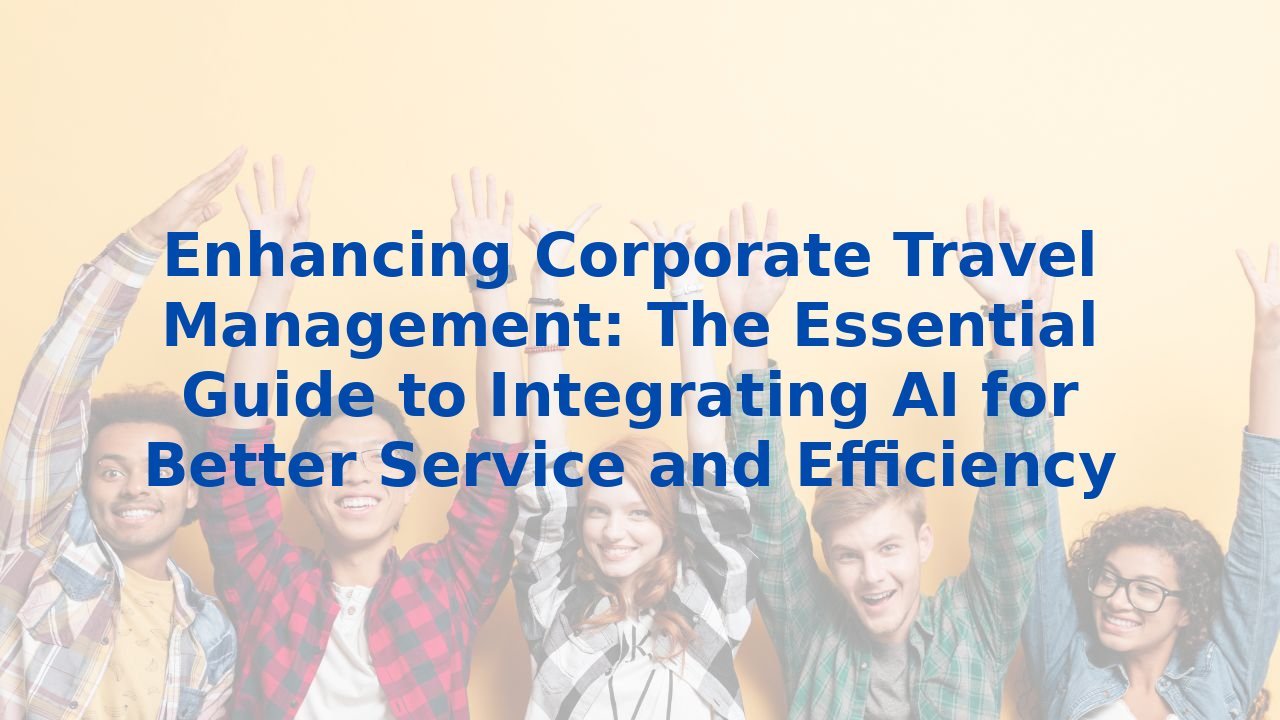Enhancing Corporate Travel Management: The Essential Guide to Integrating AI for Better Service and Efficiency
Enhancing Corporate Travel Management: The Essential Guide to Integrating AI for Better Service and Efficiency
In the fast-paced world of corporate travel, the need for efficiency and high-quality service is paramount. The integration of Artificial Intelligence (AI) into corporate travel management is not just a trend; it’s a game-changer. By harnessing AI, organizations will not only streamline their processes but also improve the quality of service they offer to travelers. Let’s explore the transformative capabilities of AI and the importance of training employees to leverage these advancements effectively.
The Role of AI in Corporate Travel Management
Imagine a world where corporate travel management is as seamless as booking a personal getaway. AI is paving the way for this transformation by optimizing various aspects of travel processes:
Personalization
One of the most significant advantages of AI is its ability to deliver personalized experiences. By analyzing vast datasets on traveler behavior and preferences, AI can make tailored recommendations for flights, accommodations, and local attractions. This creates a bespoke travel experience, enhancing traveler satisfaction and ensuring that each trip aligns with individual preferences.
Efficiency
AI excels at automating repetitive tasks. Whether it’s booking flights, managing itineraries, or processing reimbursements, AI can execute these tasks with speed and accuracy that simply cannot be matched by human effort. This not only reduces the likelihood of errors but also frees up valuable time for travel managers who can instead focus on strategic planning.
Real-Time Information
With AI, the management of travel logistics turns proactive rather than reactive. AI algorithms analyze real-time data on flight schedules and weather conditions, enabling companies to send dynamic updates to travelers. This foresight can help mitigate disruptions before they occur, leading to smoother journeys and less frustration for travelers.
Expense Management
Managing travel expenses can often be a cumbersome process. However, through AI-driven systems that streamline invoice processing and reimbursement, organizations can drastically reduce admin hours and improve accuracy. This automation creates a more secure and efficient financial framework, allowing teams to allocate resources where they matter most.
Benefits of AI for Improving Efficiency
The application of AI in corporate travel management offers a suite of benefits aimed at enhancing efficiency across the board:
Time and Cost Savings
Automating mundane tasks not only saves time but also reduces financial overhead. With AI doing the heavy lifting, travel managers can devote their energy to high-impact decision-making, ultimately leading to a more strategic approach to corporate travel.
Improved Decision Making
AI thrives on data, and its ability to provide real-time insights is invaluable for informed decision-making. By equipping travel managers with accurate data analytics, businesses can optimize their resources and maximize return on investment.
Enhanced Traveler Experience
Imagine having a personal travel assistant that knows your preferences! With AI’s real-time information capabilities, travelers can receive updates on everything from flight changes to activity suggestions, making the travel process a more enjoyable experience.
The Importance of Training Employees for AI
While the potential of AI is immense, its effectiveness hinges on knowledgeable users. Training employees to utilize AI is essential for fully realizing these benefits:
Understanding AI Capabilities
Training empowers employees to grasp the functionalities and limitations of AI tools. This understanding is crucial for optimizing their use to complement existing workflows effectively.
Adaptability
In an industry that’s continually evolving, adaptability is key. A workforce well-versed in AI tools will seamlessly integrate new technologies, keeping the organization competitive and innovative.
Ethical Considerations
With great data comes great responsibility. Through proper training, employees can better navigate the ethical landscape of AI, ensuring that data privacy and security are prioritized. This knowledge not only protects the organization but also builds trust with clients.
Conclusion
The pathway to enhancing corporate travel management is illuminated by the integration of AI. This transformative technology improves personalization, streamlines processes, and enhances the overall quality of service. Moreover, training employees to leverage AI effectively is imperative to harnessing its full potential. As businesses invest in these innovations, they will find themselves not just keeping pace but leading the way in the corporate travel sector. Embrace the future; enhance your service, and efficiency through AI-driven strategies.



